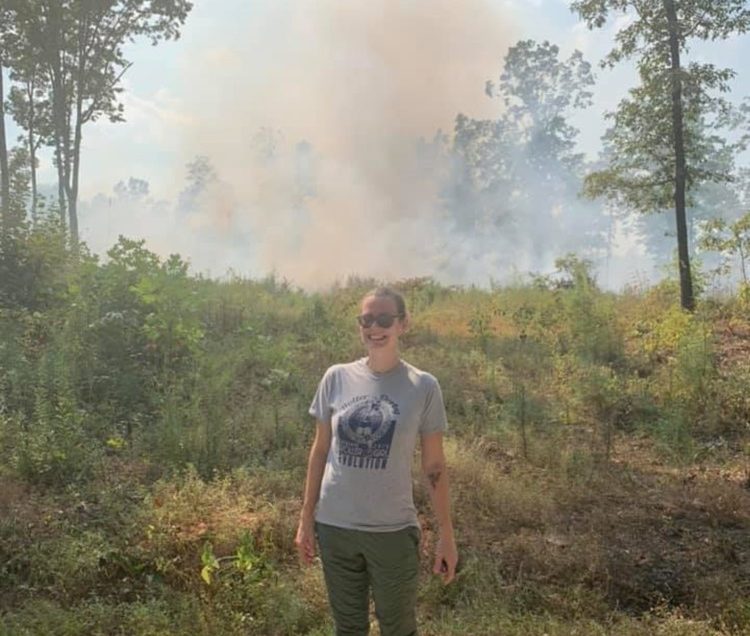Crystal Smith is a non-traditional student whose research in fire makes her a fiery force to be reckoned with.
The Clemson University junior and South Florida native says that she has always loved animals since her childhood.
“I grew up wanting to be a veterinarian, like a lot of kids do, and I went to a high school that specialized in marine biology,” she said.
Smith came to Clemson in fall of 2018, as a wildlife and fisheries major, and quickly noticed that her initial major classes were based around plants and forest ecology. After learning more about those topics, she knew that she wanted to invest more in them.
“If I truly want to help or save wildlife, I really needed to understand what their habitat requirements are. What ecosystems do they need? Healthy forests mean healthy wildlife,” she said.
Before coming to Clemson, Smith served in the United States Air Force for eight years as an aircraft mechanic. She believes being a non-traditional student gives her a different approach to school.
“I feel like I can offer a unique perspective just because I have such different experiences than a lot of people in my classes,” she said.
Her unique experiences have not only opened her up to being different among her peers but have also allowed her to expand upon her love for nature and animals. She has been involved with several different research projects.
One project involves studying how the temperature of the soil changes when organic matter is removed by fire and how the severity of the fire effects that change. A second project involves looking at how mechanical vegetation reduction combined with prescribed fire can affect plant diversity.
She’s also involved in a Creative Inquiry Project that examines gender and race in natural resources and seeks to find the benefits and challenges that women may face in the field.
Smith says that she got interested in prescribed fire after seeing how it affected many people she loved.
“I have had friends and family in Washington be directly affected by out- of-control wildfire. In 2015, my oldest son worked on the Okanogan Complex fire in eastern Washington. Then in 2016, the Pinnacle Mountain fire, near Table Rock, threatened to destroy the valley that many families lived in for generations. During that time, I had read a lot about wildfire and learned about how using prescribed fire could prevent these disastrous wildfires,” she said.
After coming to Clemson, her knowledge about prescribed fires increased.
“I didn’t know that there are plants that are specifically adapted to fire. I learned about fire cycles and how wildlife needs fire to maintain habitats they were adapted to live in. I had no idea that something as destructive as fire could be so beneficial to the environment,” she said.
As she got more involved with her desire to help the environment, her dedication caught the eye of professor and UPIC mentor, Don Hagan.
Hagan, assistant professor in forest ecology, examines the use of prescribed fires and their potential role in the ecological restoration process.
Hagan met Smith back in 2018, when she began taking a few of his classes. He learned right away that she was outstanding.
“I always appreciate when someone takes my plant classes seriously. Both of my classes are pretty challenging. And she took them seriously. You could just tell that she was mature and there to learn. She wanted to get as much out of it as she could,” he said.
Hagan and Smith began working together when he hired her as a UPIC intern for the summer of 2019. As his intern, she worked on a new fire project located near the South Carolina-North Carolina border. The goal of the project was to develop a decision support tool to help land managers figure out the best places on Lake Jocassee to use fire for habitat restoration. Hagan says that Smith played a huge role in the project.
“She’s always eager to be involved,” he said.
Her eagerness to work is what made Hagan hire her again for a second term in the summer of 2020. In that term, Smith was able to continue with the project on Lake Jocassee and see it almost to completion. After watching her work diligently, he began to see her evolve as a scientist.
“She already came into these projects with a level of maturity that your typical senior or junior doesn’t have. She’s really grown as a scientist. She’s gotten hands on experience actually doing science. From designing projects, collecting data, to analyzing data- she’s become a scientist,” he says.
As he’s watched Smith grow, he also believes she has recognized her own growth as well.
“It is really remarkable how much she has accomplished as an undergraduate student,” he said.
Smith plans to attend graduate school and then pursue a career doing ecological research and restoration with the federal government. She believes it is important to give back to the environment after her years in the Air Force.
“War is inherently destructive to the environment. Dropping bombs destroys ecosystems. After spending so many years having a negative impact on the environment, I wanted to give back. I can’t necessarily undo damage that I inadvertently caused but I can help fix damage caused by others,” she said.
Smith also believes that she has to create a better world for her children.
“I want a better planet for my children. I want to set an example for my boys that anything is possible. I cannot fail because I owe it to them to make the world a better place.”
Malaysia Barr, Junior, Communication ‘22
[END]
Get in touch and we will connect you with the author or another expert.
Or email us at news@clemson.edu



